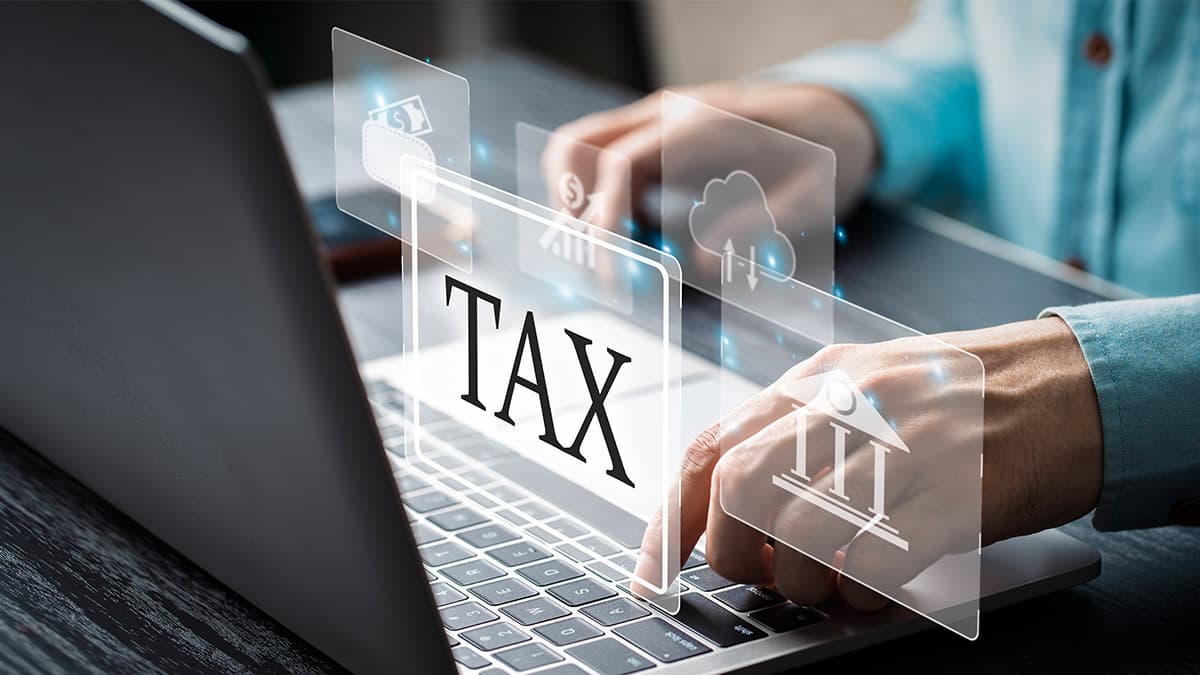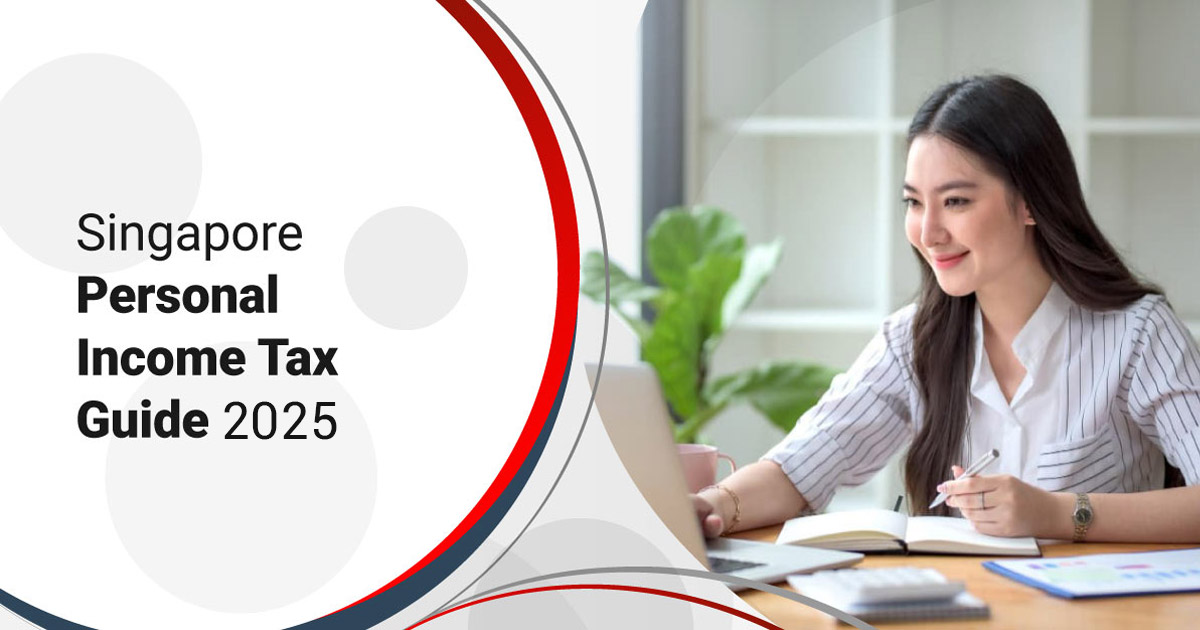
Singapore’s personal income tax rate is one of the lowest in the world. It is the key component of the country’s tax system. Thereby, to determine how much income tax an individual owes, you first need to establish whether they’re considered a tax resident and
calculate their chargeable income. Then, you apply the progressive resident tax rate to that amount.
This blog will provide a detailed overview of the Singapore personal income tax 2025. It will help individuals determine their income tax liability by understanding their tax residency status, applicable tax rates, and tax exemptions.
Personal Income Tax for Singapore Residents
Singapore residents are taxed on their income, and overseas income is remitted to this country. Tax rates are progressive, meaning a higher-income earner must pay taxes pegged to higher rates.
You will be considered a tax resident for a specific Year of Assessment (YA) if you are:
- A Singapore Citizen or Singapore Permanent Resident residing in this country, except for temporary absences or
- A foreigner who has stayed or worked in Singapore:
- For at least 183 days in the preceding calendar year or
- Continuously for 3 consecutive years, even if the stay in Singapore may be less than 183 days in the first or third year or
- A foreigner who has worked in Singapore for a continuous period spanning 2 calendar years, with a total stay of at least 183 days. It applies to employees entering this country but excludes company directors, public entertainers, or professionals.
Starting from YA 2024, the top marginal personal income tax rate has risen to enhance progressivity. Income exceeding S$500,000 up to S$1 million will be taxed at 23%, while income over S$1 million will be taxed at 24%, up from the current
22%.
The personal income tax rates for residents from YA 2024 onwards are:
| Chargeable Income |
Income Tax Rate (%) |
Gross Tax Payable ($) |
| First S$20,000
Next S$10,000 |
0
2 |
0
200 |
| First S$30,000
Next S$10,000 |
–
3.50 |
200
350 |
| First S$40,000
Next S$40,000 |
–
7 |
550
2,800 |
| First S$80,000
Next S$40,000 |
–
11.5 |
3,350
4,600 |
| First S$120,000
Next S$40,000 |
–
15 |
7,950
6,000 |
| First S$160,000
Next S$40,000 |
–
18 |
13,950
7,200 |
| First S$200,000
Next S$40,000 |
–
19 |
21,150
7,600 |
| First S$240,000
Next S$40,000 |
–
19.5 |
28,750
7,800 |
| First S$280,000
Next S$40,000 |
–
20 |
36,550
8,000 |
| First S$320,000
Next S$180,000 |
–
22 |
44,550
39,600 |
| First S$500,000
Next S$500,000 |
–
23 |
84,150
115,000 |
| First S$1,000,000
In excess of S$1,000,000 |
–
24 |
199,150 |
Singapore’s tax system is known for its simplicity and territorial approach. Individuals in Singapore do not face inheritance tax or capital gains tax. Taxation focuses solely on income earned within the country, with most overseas income being exempt.
Tax regulations differ based on an individual’s tax residency status. The deadline for tax filing is April 15th each year, though electronic filing extends this to April 18th. Late filing may result in penalties. Income tax is calculated on a preceding-year basis. As of January 2025, gains from selling foreign assets in Singapore remain tax-exempt due to the absence of a capital gains tax.
Singapore Non-Residents Personal Income Tax
- Non-residents are foreigners who have stayed or worked in Singapore for less than 183 days in a calendar year.
- They are taxed only on their income in Singapore and are not included in the taxable income. They are subjected to tax at a flat rate of 15% or progressive resident tax rates as per the table above, which results in a higher tax amount.
- Note that the non-resident personal income tax rate for director’s fees, consultation fees, and other income is presently at 24%. This excludes employment income and certain income taxable at reduced withholding tax rates.
Important Note: Starting from YA 2024, non-resident individuals (excluding employment income and certain income taxed at lower rates) income tax rate has been increased from 22% to 24%. This change aims to align the income tax rates for non-residents with those for residents.
Tax Deductions and Exemptions in Singapore
Tax exemptions and deductions can help to lower residents’ tax liability. Residents are eligible for various tax exemptions and deductions, such as:
- Personal reliefs
- Deductions for employment expenses
- Contributions to approved charitable or social causes
Non-residents do not qualify for most of these exemptions and deductions. There are also some groups of individuals who are exempted from personal income tax. These include:
- Non-resident individuals whose employment is for not more than 60 days in a calendar year:
- Non-resident individuals in Singapore employed for a short period of not more than 60 days in a calendar year are exempt from paying personal income tax on their employment income.
- Individuals who receive certain types of income that are exempted from tax:
- Some types of income are exempted from personal income tax in Singapore. These include certain types of:
- Government grants
- Scholarships and awards
- Certain gains from the disposal of investments
- Certain income earned by approved charitable or religious organisations
Even if individuals fall under one of these exempt categories, they may still be required to file a
tax return in Singapore to report their income. Other taxes, such as
Goods and Services Tax (GST) and tax levied on rental income, may apply.
Related Read: 14 Strategies to Reduce your Personal Income Tax »
Withholding Taxes on Income of Non-Resident Individuals
Non-resident individuals are subject to withholding tax on certain income when it’s due and receivable. The applicable withholding tax rate depends on the type of income and the Year of Assessment (YA).
| Income Type |
Withhold Tax Rate form 2024 Onwards |
Withhold Tax Rate from YA 2017 to YA 2023 |
| Compensation, which includes director’s fees, received by non-resident director |
24% |
22% |
| Earnings obtained by non-resident professionals for services given in Singapore |
Gross income: 15%
Net income: 24% |
Gross income: 15%
Net income: 22% |
| Earning of non-resident public entertainers |
Concessionary rate: 15% |
Concessionary rate up to 31 Mar 2022: 10% Concessionary rate from 1 Apr 2022: 15% |
| SRS withdrawals received by non-Singaporean |
24% |
22% |
| Payment related to interest, commission, loans, or debts |
Final withholding tax rate reduced to 15% (conditions apply)
Otherwise taxed at 24% |
The final withholding tax rate is either 15% (subject to conditions) or 22% if the reduced rate does not apply. |
| Royalties or lump sum payments for using movable properties |
Final withholding tax rate reduced to 10% (conditions apply)
Otherwise taxed at 24% |
Final withholding tax rate reduced to 10% (conditions apply)
Otherwise taxed at 22% |
Differences in Income Tax Rates For Residents vs Non-Tax Residents
| Tax Residency |
Singapore distinguishes between tax residents and non-residents for income tax purposes. |
| Tax Resident Criteria |
You are a tax resident if you are a Singaporean citizen, a Singaporean permanent resident, or a foreigner who stays or works in Singapore for 183 days or more in a year. |
| Non-Tax Resident |
If you don’t meet the tax resident criteria, you are considered a non-tax resident. |
| Non-Resident Tax Rates |
Non-residents generally face a flat tax rate of 24% on most income. Exceptions include Singapore employment income (taxed at 15%) and certain income types with reduced withholding rates. |
| Resident Tax Rates |
Tax residents benefit from progressive tax rates, meaning lower tax rates for most income levels compared to non-residents. |
| Tax Advantages of Residency |
Being a tax resident often results in significant tax savings, particularly for individuals earning below S$320,000 – S$400,000 annually. |
| Importance of Physical Presence |
Frequent travelers should track their days spent in Singapore to ensure they maintain their tax residency status. |
How Can InCorp Global Help?
As Singapore continues to uphold its reputation as a global financial hub, staying informed about tax regulations remains essential for everyone involved in its economy.
Understanding the nuances of the system, from residency rules to applicable deductions, can significantly impact your financial well-being. Don’t leave your tax strategy to chance. InCorp Global can help you proactively plan and optimise your tax position, ensuring you benefit from all available advantages.
From residents seeking to minimise their tax burden to non-residents navigating international tax implications, we offer comprehensive services tailored to your specific needs. Reach out to us today to explore how we can help you achieve your financial goals in Singapore.
Frequently Asked Questions About Personal Income Tax in Singapore
- Your personal income tax is influenced by certain factors, including your:
- Tax residency
- Chargeable income
- Personal income tax rates
- Applicable tax exemptions
- These types of income are not taxed in Singapore:
- Capital gains tax
- Shipping income as specified under Section 13A and Section 13E of the Income Tax Act 1947
- Foreign-sourced dividends, service income, and branch profits obtained by a resident firm under Section 13(8)
- You can either file your income tax electronically or engage an income tax expert to help you do so and remove the hassle of doing it yourself.
About the Author
InCorp's content team includes talented copywriters from our regional group and globally. We contribute informative, thought leadership, and market-trending articles to guide aspiring business entrepreneurs to a higher level across the Asia-Pacific region.
More on Business Blogs
 Singapore’s personal income tax rate is one of the lowest in the world. It is the key component of the country’s tax system. Thereby, to determine how much income tax an individual owes, you first need to establish whether they’re considered a tax resident and calculate their chargeable income. Then, you apply the progressive resident tax rate to that amount.
This blog will provide a detailed overview of the Singapore personal income tax 2025. It will help individuals determine their income tax liability by understanding their tax residency status, applicable tax rates, and tax exemptions.
Singapore’s personal income tax rate is one of the lowest in the world. It is the key component of the country’s tax system. Thereby, to determine how much income tax an individual owes, you first need to establish whether they’re considered a tax resident and calculate their chargeable income. Then, you apply the progressive resident tax rate to that amount.
This blog will provide a detailed overview of the Singapore personal income tax 2025. It will help individuals determine their income tax liability by understanding their tax residency status, applicable tax rates, and tax exemptions.



